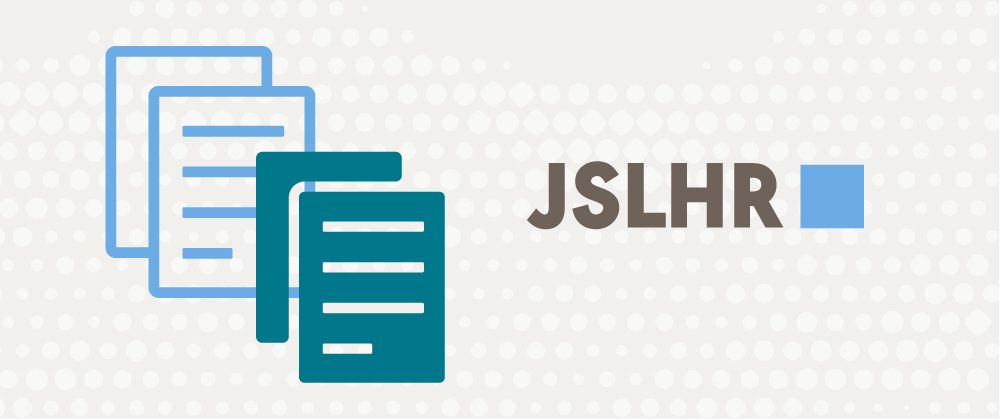During the last 10 years, leaders across the sciences have made important strides to increase research transparency and reproducibility. Recognizing the importance of this, ASHA Journals have given authors a number of avenues to boost reproducibility, including adopting Transparency and Openness Promotion (TOP) guidelines.
Still, there are more opportunities for researchers in communication sciences and disorders (CSD) to increase reproducibility of the research in our discipline. Guest Editor Rachel M. Theodore brings us the latest forum on this very topic in the Journal of Speech, Language, and Hearing Research (JSLHR), providing both the rationale and some practical ideas for increasing researching transparency in the sciences.
Making Your Research More Transparent
The forum opens with three tutorials that aim to show scientists how they can incorporate research transparency into their work. First, Brown and Strand explain the benefits of preregistering your research and offer practical tips as well as issues researchers will likely encounter.
Next, Chow et al. encourage authors working on primary studies to provide more comprehensive data reports along with their article to ensure that their important work is captured in subsequent meta-analyses. In the final tutorial, Cavanaugh and colleagues discuss the importance of effect sizes when conducting reproducible research.
Open Science in Speech and Aphasia Research
Three articles focus on open science in specific topics. Karidas et al. review 18 accepted aphasia treatment approaches to determine which results had been replicated. The authors also discuss the importance of establishing a replication database.
Then, Strand and Brown examine how seemingly small choices can affect the reproducibility of a study and provided examples of how these choices can produce different data. Later in the forum, Benway et al. emphasize the importance of open access datasets to open science and highlighted examples that clinicians can use.
Open Science in CSD
Three articles discuss how stakeholders in CSD currently use open science and what some of the benefits are to doing so. First, El Amin and colleagues share the results of their surveying active researchers in CSD on how they use four open science practices; these authors found that although respondents weren’t aware of many of these practices, they were interested in learning more.
In the next article, Long et al. show how open access can help authors get more eyes—and online attention—on their work. Later in the forum, Schroeder and colleagues focus on CSD journals, finding that they may impede adoption of open science practices by not encouraging or requiring authors to participate in such practices.
The forum closes with an article by Girolamo et al. emphasizing that open science must include populations historically excluded from research. By incorporating Black, Indigenous, and People of Color (BIPOC) as both scientists and participants, the research community can expand accessibility and transparency.
Making Open Science a Reality
This forum focuses on the roles we can all play to increase open science in CSD. Researchers, authors, and publishers must all work together in order to bring the sciences up to speed. As you plan out future work for JSLHR, we hope that you consider submitting a registered report and sharing your data to help future scientists perform important replication studies.
We’d like to thank Dr. Theodore and all of the authors and reviewers for their work bringing this forum to readers of the ASHA Journals. To hear more about the forum from Dr. Theodore, check out the video under “Related Video.” You can read the forum in the latest issue of JSLHR or explore the individual articles below!
Related Video
Explore the Forum
Benway, N. R., Preston, J. L., Hitchcock, E., Rose, Y., Salekin, A., Liang, W., & McAllister, T. (2023). Reproducible speech research with the artificial intelligence–ready PERCEPT corpora. Journal of Speech, Language, and Hearing Research, 66(6), 1986–2009. https://doi.org/10.1044/2023_JSLHR-22-00343
Brown, V. A., & Strand, J. F. (2023). Preregistration: Practical considerations for speech, language, and hearing research. Journal of Speech, Language, and Hearing Research, 66(6), 1889–1898. https://doi.org/10.1044/2022_JSLHR-22-00317
Cavanaugh, R., Quique, Y. M., Swiderski, A. M., Kallhoff, L., Terhorst, L., Wambaugh, J., Hula, W. D., & Evans, W. S. (2023). Reproducibility in small-N treatment research: A tutorial using examples from aphasiology. Journal of Speech, Language, and Hearing Research, 66(6), 1908–1927. https://doi.org/10.1044/2022_JSLHR-22-00333
Chow, J. C., Sandbank, M., & Hampton, L. H. (2023). Guidance for increasing primary study inclusion and usability of data in meta-analysis: A reporting tutorial. Journal of Speech, Language, and Hearing Research, 66(6), 1899–1907. https://doi.org/10.1044/2023_JSLHR-22-00318
El Amin, M., Borders, J. C., Long, H. L., Keller, M. A., & Kearney, E. (2023). Open science practices in communication sciences and disorders: A survey. Journal of Speech, Language, and Hearing Research, 66(6), 1928–1947. https://doi.org/10.1044/2022_JSLHR-22-00062
Girolamo, T., Castro, N., Eisel Hendricks, A., Ghali, S., & Eigsti, I.-M. (2023). Implementation of open science practices in communication sciences and disorders research with Black, Indigenous, and People of Color. Journal of Speech, Language, and Hearing Research, 66(6), 2010–2017. https://doi.org/10.1044/2022_JSLHR-22-00272
Karidas, S., Hinckley, J. J., & Brekher, I. (2023). Replication in evidence-based aphasia treatments. Journal of Speech, Language, and Hearing Research, 66(6), 1958–1966. https://doi.org/10.1044/2022_JSLHR-21-00688
Long, H. L., Drown, L., & El Amin, M. (2023). The effect of open access on scholarly and societal metrics of impact in the ASHA journals. Journal of Speech, Language, and Hearing Research, 66(6), 1948–1957. https://doi.org/10.1044/2022_JSLHR-22-00315
Schroeder, S. R., Gaeta, L., El Amin, M., Chow, J. C., & Borders, J. C. (2023). Evaluating research transparency and openness in communication sciences and disorders journals. Journal of Speech, Language, and Hearing Research, 66(6), 1977–1985. https://doi.org/10.1044/2022_JSLHR-22-00330
Strand, J. F., & Brown, V. A. (2023). Spread the word: Enhancing replicability of speech research through stimulus sharing. Journal of Speech, Language, and Hearing Research, 66(6), 1967–1976. https://doi.org/10.1044/2022_JSLHR-22-00267







